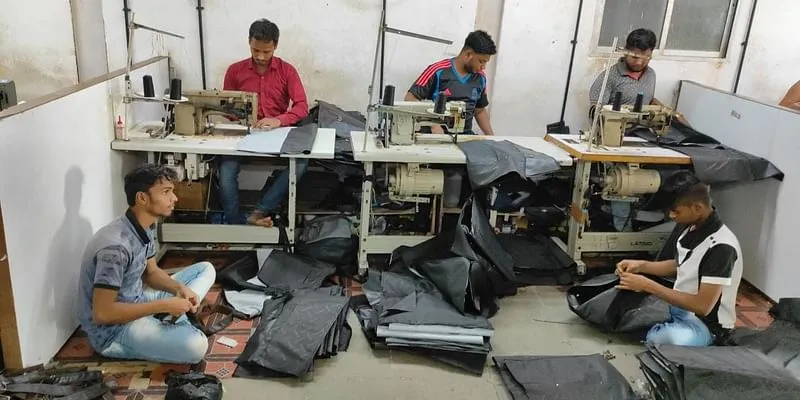From a Rs 5,000 investment to Rs 35-Cr turnover, COSMUS’ bags to riches story
A chance visit to Mumbai and many meandering paths later, MI Siddiqui has established COSMUS as a prominent bag manufacturing company. His next goal is to ride the D2C wave.
It was supposed to be just a week-long trip to Mumbai to visit a cousin after completing a BBA course. Instead, Bihar native MI Siddiqui ended up staying back in the metropolis to start his bag manufacturing business from its famed slums, Dharavi, five years later, in 2003.
The business, which began with Rs 5,000 that Siddiqui borrowed from friends, is today , a company with a Rs 35-crore turnover.
From 1998 to 2021, the journey has been meandering, rewarding, and challenging for Siddiqui.
Detours before destination
When Siddiqui first decided to extend his stay in Mumbai, he spent the money meant for his vacation on doing a computer course.
Back home in Bihar, Siddiqui’s parents, especially his father, who ran a medical store, were not happy with his decision. But Siddiqui was determined.
He worked as an engineer in companies including Coca-Cola and Cadbury. In 2000, he quit his job to pursue some spiritual endeavours. But when he returned to mainstream life a year later, he couldn’t find a job.
After struggling for seven-eight months, Siddiqui decided to start a business. He asked his family for money, but they refused. He braced for the long haul.
Then, a friend, who had a screen-printing business in Dharavi, asked Siddiqui to help sell the bags manufactured by him. Siddiqui says he would walk from Dharavi to Bandra to sell them.
For a few days, there wasn’t much success. Then, he bagged a corporate order for 300 duffel bags from a store in Parel. The profit margin on each bag was Rs 65.
A year and a half later when the business called Flora Gift had just taken off, Siddiqui’s friend decided to close shop and move to Ulhaspur. Confronted with uncertainty once again, Siddiqui decided to take charge.
He collected Rs 5,000 from friends, found a place in Dharavi again, and with four stitching machines launched his bag manufacturing company, COSMOS Bags in 2003. The company would later be renamed COSMUS.
Despite having a limited understanding of the market, Siddiqui started manufacturing bags for corporate orders.
“I had limited knowledge of the bag industry, so I focused only on places where I would get orders from,” he says.
For many years, COSMUS remained B2B-focused, supplying bags to companies such as Hutch and Vodafone, before venturing into retail and ecommerce.

COSMUS claims to be a 100 percent made-in-India brand.
The scale of the business
At present, COSMUS’ business has three divisions: corporate, retail, and ecommerce. The company listed on ecommerce platform Snapdeal in 2012. Its products are currently available on Amazon, , , and Myntra, besides multiple physical outlets, where it has tie-ups with distributors.
Siddiqui says his focus has always been on volume, price, and quality.
From four machines, COSMUS has ramped up to 95 in Dharavi. The company produces around 40,000 bags a month in categories such as duffel bag, laptop bag, and school bag. It has a total of 400 stock-keeping units.
With customer acquisition as the goal, COSMUS’ bags are priced a little lower than those of competitors, namely Skybags, Safari, VIP Bags, and Wildcraft. It’s a deliberate strategy, Siddiqui says of the lower pricing. The price range is Rs 799-2,999.
To maintain quality, Siddiqui hires good people. “We have managers at every level to ensure quality control.”
Initially, the bags were manufactured with raw materials imported from China and Taiwan. But now, COSMUS claims to be a 100 percent made-in-India brand. Siddiqui says the company has found domestic manufacturers for some materials, while others are developed in-house.
The company has seen a steady rise in turnover in the last few years. In FY19, it clocked a turnover of Rs 13 crore, which soared more than two and half times to Rs 35 crore in FY20.
Towards self-reliance
As COVID-19 disrupted supply chains around the world early last year, the conversation around self-reliance started growing louder and stronger, with Prime Minister Narendra Modi launching the Aatmanirbhar Bharat initiative. Businesses realised the peril of depending on China for their manufacturing needs.
Siddiqui says the scenario is changing as “India can produce raw materials better than China”, but adds that reliance on imports will persist for some time. He cites the example of PVC, a raw material used for making bags.
“PVC is used by a lot of companies to manufacture bags,” he says. “However, Indian factories don’t get the licence to manufacture it as it is an environmental pollutant. So, 90 percent of this material comes from China.”

MI Siddiqui with COSMUS Team
Eye on D2C
Siddiqui says that even a few years ago, 70 percent of his sales came from offline stores. “But COVID-19 made everyone realise that going online is the way to move forward and survive. Today, online accounts for more than 90 percent of sales.”
In the wake of the pandemic, as businesses across the board suffered, COSMUS was no exception. Siddiqui not only had to lay off 50 percent of his workers, but also had to deal with myriad restrictions imposed by the government, as Dharavi turned into a COVID-19 hotspot. With workstations closed, the area sealed, and workers ready to leave the city, production and supply almost came to a standstill.
The situation improved when coronavirus cases were gradually contained. Siddiqui started work to fulfil orders, sometimes with as few as 10 workers, he recalls.
After ecommerce deliveries were permitted by the government, COSMUS’ online business revived within 20 days, says Siddiqui. Having 45 warehouses in different Indian cities too helped ensure timely deliveries of orders.
The company also pivoted to manufacturing masks.
Retail and corporate sales are, however, nowhere near recovery, says Siddiqui. In fact, till Diwali, there were no orders. At present, they contribute as little as 5 percent to the business.
Given the online shift by consumers and businesses alike, Siddiqui is focusing on improving his company’s website. The aim is to join the direct-to-customer (D2C) wave, a business trend that has emerged strongly out of the pandemic. COSMUS has thus set up social media pages on Facebook and Instagram to direct traffic to its website.
In addition, the company is planning to have franchisees across the country. This step is aimed at removing inconsistencies between the pricing of products online and offline, he adds.
Edited by Lena Saha









